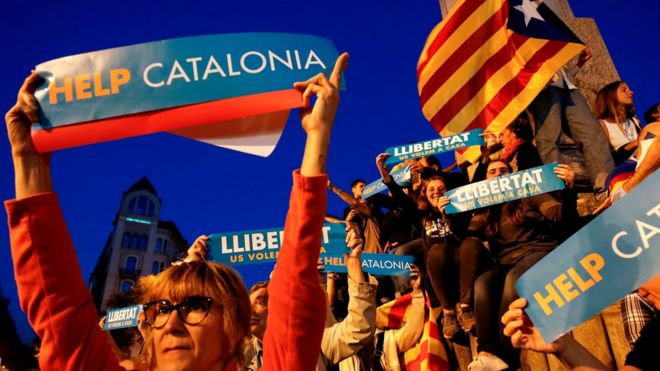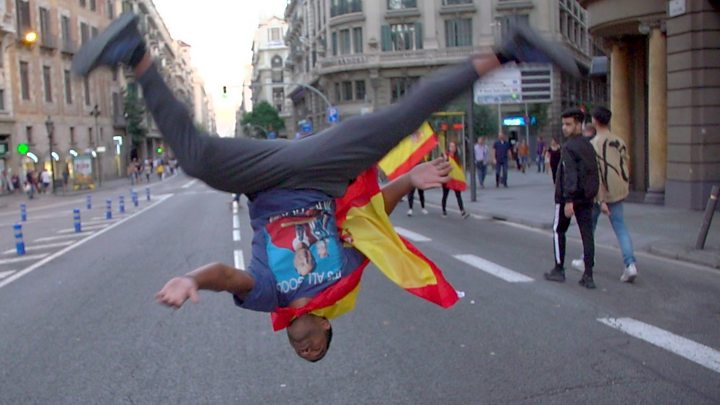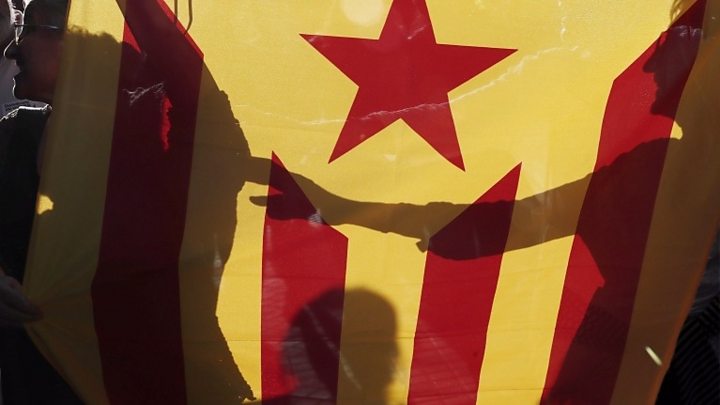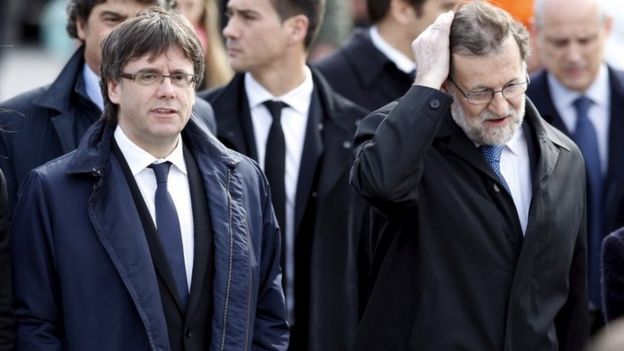 AFP
AFP
Spain is to start suspending Catalonia's autonomy from Saturday, as the region's leader threatens to declare independence.
The government said ministers would meet to activate Article 155 of the constitution, allowing it to take over running of the region.
Catalonia's leader said the region's parliament would vote on independence if Spain continued "repression".
Catalans voted to secede in a referendum outlawed by Spain.
Some fear the latest moves could spark further unrest after mass demonstrations before and since the ballot on 1 October.
Spain's supreme court declared the vote illegal and said it violated the constitution, which describes the country as indivisible.
Article 155 of the constitution, which cemented democratic rule three years after the death of dictator General Francisco Franco in 1975, allows Madrid to impose direct rule in a crisis but it has never been invoked.
BBC Madrid correspondent Tom Burridge says that for Madrid this is about upholding the rule of law in Catalonia, protecting the Spanish constitution and disciplining what it sees as an unruly, disobedient devolved government.
However, the central government wants to minimise the risk of large-scale demonstrations, our correspondent says. Civil servants and government lawyers have thought long and hard about what measures to adopt and when and how they should be implemented.
- Cases for and against independence
- Catalan crisis in 300 words
- Reality Check: Would Catalonia be a viable country?
A slow game
By Katya Adler, BBC Europe editor
The Catalan crisis is reaching breaking point but we have to be careful here. Nothing will happen from one day to the next.
Political rhetoric aside, both the Spanish government and Catalan regional leaders know sentiments are running so high across Spain at the moment, that millions are poised to take to the streets.
Once the shopping list of measures has been decided, the Catalan leader has the right of reply and we're told there is no legal window of opportunity for him to do so, meaning this could take days or weeks.
Finally, the Spanish Senate needs to approve the measures.
What is Madrid's position?
Spanish Prime Minister Mariano Rajoy had set a deadline of 10:00 local time (08:00 GMT) for Catalan leader Carles Puigdemont to offer a definitive answer on the independence question, and called on him to "act sensibly".
When it passed, the Spanish government accused the Catalan authorities of seeking confrontation.
"The Spanish government will continue with the procedures outlined in Article 155 of the Constitution to restore legality in Catalonia's self-government," it said.

"It denounces the attitude maintained by those in charge of the Generalitat [Catalan government] to seek, deliberately and systematically, institutional confrontation despite the serious damage that is being caused to the coexistence and the economic structure of Catalonia.
"No-one doubts that the Spanish government will do all it can to restore the constitutional order."
What happens now?
Mr Rajoy is due to attend an EU summit in Brussels on Thursday afternoon.
On Saturday the government will be expected to draw up a list of specific measures under Article 155 of the constitution, launching the transfer of powers from Catalonia to Madrid.

The article says: "If a self-governing community does not fulfil the obligations imposed upon it by the constitution or other laws, or acts in a way that is seriously prejudicial to the general interest of Spain, the government... may... take all measures necessary to compel the community to meet said obligations, or to protect the above-mentioned general interest."
It is thought the measures implemented could range from taking control of the regional police and finances to calling a snap election.
Spain's Senate, controlled by Mr Rajoy's conservative Popular Party (PP) and its allies, would then have to approve the list.
Analysts say Article 155 does not give the government the power to fully suspend autonomy, and it will not be able to deviate from the list of measures.
Where does this leave the Catalan leader?
Mr Puigdemont said in a letter to Mr Rajoy on Thursday morning that the independence declaration remained suspended but this could change.
"If the government continues to impede dialogue and continues with the repression, the Catalan parliament could proceed, if it is considered opportune, to vote on a formal declaration of independence."
But he faces an uphill struggle - it is likely that senior figures in charge of internal security in Catalonia could be dismissed, and control of the region's police force could pass to Madrid.
The regional parliament could also be dissolved.
 REUTERS
REUTERS
One Spanish newspaper has reported that Mr Puigdemont might nominally remain in his job but Madrid would aim to take control of many of his duties and powers.
Ultimately the process could end in regional elections but the Spanish constitution does not impose any time limit.

No comments:
Post a Comment